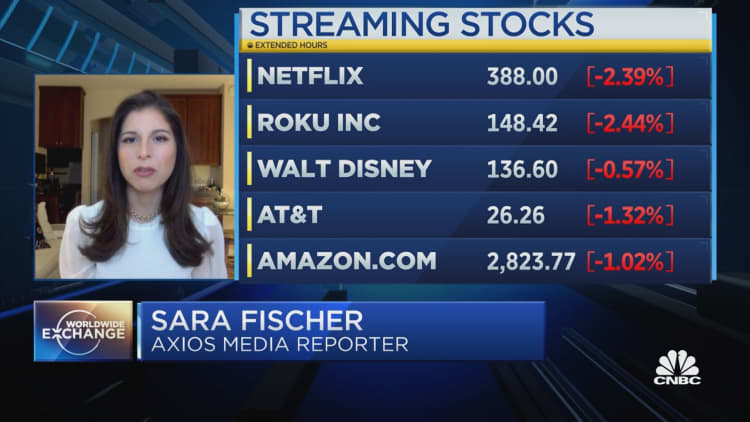Netflix has gone from airing "Squid Game" to becoming a player in it.
The streaming company's stock price fell 2.6% on Monday to close at $387.15, though it was down much more in the morning before a late-day rally. That follows Friday's 22% plunge, its steepest one-day drop since July 2012.
Netflix shares are now down about 45% from their record intraday high in November and are trading at their lowest since April 2020, when Covid-19 was in the early days of shutting down the U.S. economy. The plunge has been so precipitous it's almost as if the pandemic never happened for Netflix investors.
Of course, Netflix's business boomed in 2020 and through much of last year as people were stuck at home in quarantines. The company added more than 36 million subscribers in 2020 and 18.2 million in 2021.

The stock pushed past $700 to a record on Nov. 19, two months after Netflix released "Squid Game," the South Korean action show that became the company's biggest series ever. The show follows fictional contestants competing in a series of children's games in the hopes of winning windfall cash so they can pay off their debts. Contestants are killed if they lose a game.
The surprise popularity of "Squid Game" likely contributed to Netflix's stock surge, but it hasn't been able to help it avoid an ensuing bloodbath.
With investors already rotating out of the big stay-at-home winners, Netflix further spooked the market last week in its fourth-quarter earnings report. The company said it expects to add just 2.5 million subscribers in the first quarter, far below the 6.93 million that analysts expected, according to StreetAccount estimates.
Media industry concerns
The economic reopening may not be the only thing stunting Netflix's growth.
In the past two years, every major media company completely reorganized its business to capture a slice of Netflix's surging value. Disney, AT&T's WarnerMedia, Comcast's NBCUniversal and ViacomCBS accelerated their shift to streaming, overhauling their internal business structures along the way, as part of a land grab for cord cutters.
The pandemic didn't change the shift to streaming — it just hastened it. Millions of Americans cancel traditional pay TV each year. Focusing on an unbundled streaming product that allows consumers to watch wherever and whenever they want is a logical move for any media company. The industry followed Netflix's lead, and the company is now acknowledging that competition is eating into its growth.
While Netflix's loss could be viewed as its competitors' gain, research analyst Michael Nathanson of MoffettNathanson has a dimmer perspective.
"We see this Netflix quarter as a worrying data point for the rest of the streaming industry on multiple fronts," Nathanson, whose firm recommends holding Netflix shares, wrote in a note to clients after the report. "The sell-off in Netflix's equity makes it much harder to use as a bullish comp in the media world."
In other words, if Netflix is now valued at $350 per share, should investors in Disney, ViacomCBS and Discovery also revalue those companies? That's what appears to be happening. Disney shares are down about 7% since Netflix announced its fourth-quarter earnings, while shares of ViacomCBS have fallen close to 4%.
Investment firm Jefferies downgraded Netflix on Monday and suggested the company consider shifting its focus from streaming to video games so it can offer a new growth story to reinvigorate shareholders. Netflix co-founder and co-CEO Reed Hastings said on the earnings call that he wants Netflix to be a world leader in gaming.
If that sounds too extreme, "Stranger Things" have happened.
Disclosure: Comcast's NBCUniversal is the parent company of CNBC.
WATCH: If tech stocks aren't generating free cash flow, we'll pass



